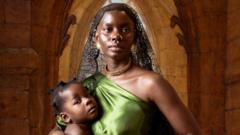Dola Posh embodies multiple identities: a Nigerian woman, a Briton, and a passionate photographer. However, after giving birth during a Covid lockdown, she felt a profound disconnection from herself. Just six days after delivering her daughter, Dola lay in a hospital bed grappling with an avalanche of changes to her life—changes that made her question if she could ever return to her passion for photography.
The isolation of the lockdown compounded her feelings, as family members, unable to visit, bombarded her with calls of encouragement from afar. With her mother thousands of miles away in Lagos, Dola became increasingly overwhelmed. "I thought: ‘I’m me; the baby’s out, I’m still me.’ But no, I wasn’t me any more," Dola reflected, recounting the deep emotional turmoil indicative of postnatal depression, a condition that often disproportionately affects black mothers.
Faced with overwhelming expectations and unsolicited advice about parenting, Dola struggled to feel empowered in her new role. Speaking frankly, she expressed, “There was too much talk, too much control around how I should raise the child... it made me feel like I didn’t know what I was doing.” The pressures of motherhood, combined with sleep deprivation and a profound feeling of isolation, led her to a dark moment when she contemplated ending her own life.
In her most vulnerable state, Dola reached out to a health visitor who encouraged her to seek therapy. It was during these sessions that she found a healing outlet in photography. Capturing self-portraits became a therapeutic process through which she could document her experiences with depression, using her camera to reclaim her sense of self while nurturing her baby—Monioluwa.
Raised in a religious household rich in art and tradition, the symbolism of mother and child resonated deeply with Dola as she sought to articulate her feelings through her lens. As she composed her portraits, she discovered an unconscious connection to her upbringing and a method to reconnect with her identity. Embracing elements from her heritage, such as the veil she associated with her religious roots, became significant in her artistic expression.
Sharing her story publicly helped Dola dismantle the stigma surrounding postnatal depression. "Now I am starting to work on the stories of what actually happened and the darkness...,” she said, emphasizing the need for open discussions about the complexities of motherhood.
Dola’s resilience and dedication to her craft recently earned her recognition from camera manufacturer Leica, which will allow her to expand her series and advocate for the visibility of challenges faced by black mothers. Her mission is clear: to create a world where black mothers no longer feel burdened by their struggles, a world where they can see their experiences reflected in media narratives.
“I want a world where black mothers don’t have to carry so much burden,” Dola affirmed, emphasizing the importance of breaking the silence surrounding mental health issues. By openly sharing her struggles, she encourages others to confront their challenges and redefine what it means to be a mother in today’s society.
This powerful account serves as a reminder of the resilience many women possess in the face of mental health challenges and highlights the need for empathy and understanding within communities. The journey of motherhood, as told by Dola Posh, is one of both struggle and profound personal growth.





















